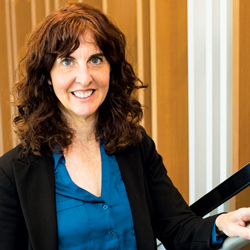Investigating Big Ideas at the Smallest Scale
Linda Broadbelt’s award-winning work in complex kinetic modeling has spurred diverse collaborations to solve practical problems.
With an open mind and collaborative spirit, Northwestern Engineering’s Linda Broadbelt works on big ideas at a small scale, bringing her computational analysis work to fields as diverse as biomass conversion, artwork degradation, shale gas conversion, and polymer recycling.
 “These problems are all compelling and intellectually engaging, and I’ve been comfortable to pursue them because I’ve had some world-class partners,” says Broadbelt, Sarah Rebecca Roland Professor in the Department of Chemical and Biological Engineering.
“These problems are all compelling and intellectually engaging, and I’ve been comfortable to pursue them because I’ve had some world-class partners,” says Broadbelt, Sarah Rebecca Roland Professor in the Department of Chemical and Biological Engineering.
Her lab tackles global issues like energy and the environment by investigating chemical reactions at the atomic scale, working with partners from around the world, in industry as well as in academia.
“It’s not trivial to dive into new areas where you’re collaborating with people at a pharmaceutical company one day and with researchers from the Rijksmuseum in Amsterdam the next,” says Randall Snurr, John G. Searle Professor and chair of the Department of Chemical and Biological Engineering. “Linda is fearless in jumping into new fields and showing the impact of kinetic modeling and quantitative engineering tools.”
This year, Broadbelt was named a member of the National Academy of Engineering, among the highest honors in engineering. In recognizing her accomplishments as a McCormick School of Engineering faculty member over the past 25 years, the NAE cited her “contributions to complex kinetic modeling” and impact on industry.
A Prominent Partner
A member of the elite American Institute for Medical and Biological Engineering College of Fellows and honored by the American Institute of Chemical Engineers, Broadbelt is internationally recognized for her ability to assemble quantitative descriptions of complex systems characterized by thousands of reactions and molecules.This expertise has made her a much sought-after partner.
During one prominent research project with Dow Chemical, for example, Broadbelt and her team developed methods for predicting the backbone composition and arrangements of monomers in polymers. In another collaboration with ExxonMobil, Broadbelt’s group constructed the most detailed models of biomass conversion.
“These opportunities allow our group to have an impact on addressing real-world problems,” Broadbelt says.
Most recently, she has been investigating hydrocarbon conversion, specifically shale gas’s potential as a bridge fuel, while she and others continue to explore other innovative renewable technologies. In addition, Broadbelt’s team is examining polymer recycling, aiming to create strong and resilient plastics that nevertheless can break down easily after use, thereby minimizing environmental impact.
“We still care about making real materials, real chemicals, things that are at the highest production scale,” says Broadbelt, whose honors include the Fulbright Distinguished Scholar Award and the National Science Foundation’s Faculty Early Career Development (CAREER) Award.
Contributing to a Vibrant Environment
A past recipient of Northwestern’s Dorothy Ann and Clarence L. Ver Steeg Distinguished Research Fellowship Award that recognizes research and scholarship that enhances the University’s reputation, Broadbelt’s contributions also include educating the next generation of engineers.
“I feed off the special environment here at Northwestern—inquisitive, collaborative, and ambitious. That’s what allows different kinds of interactions to flourish.”
As chair of the Department of Chemical and Biological Engineering from 2009 to 2017, Broadbelt led the department’s growth in both performance and reputation, including its emergence as a world leader in synthetic biology. Since 2017, she has served on Northwestern Engineering’s senior leadership team as associate dean for research.
“Linda is a wonderful role model for many of us in her teaching and mentoring of students, top-level research, and service to the department and the University,” Snurr says.
For Broadbelt, it’s been a joy. “I feed off the special environment here at Northwestern—inquisitive, collaborative, and ambitious,” she says. “That’s what allows different kinds of interactions to flourish.”
